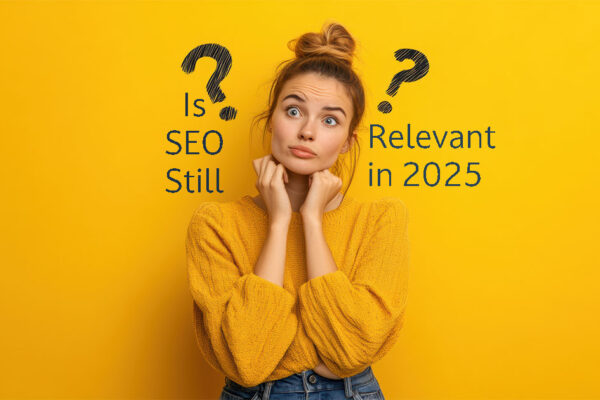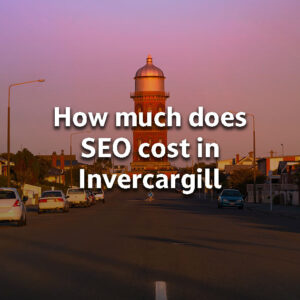The Ongoing Importance of SEO in 2025

Filters
Results
With the evolving nature of the internet, AI and digital marketing in general, one question often arises from our clients is: is SEO still relevant? The answer, as we step into 2025, is a resounding yes.
SEO, or Search Engine Optimisation, remains a critical component of digital marketing. It’s the key to visibility in a crowded online space, helping businesses reach their target audience effectively.
But SEO is not static. It’s a dynamic field that requires adaptability and a keen understanding of the latest trends. As search engine algorithms evolve, so too must our SEO strategies.
This article aims to demystify SEO in 2025. We’ll delve into the practical aspects of SEO, from writing great content to understanding the impact of domain names.
Whether you’re an aspiring entrepreneur, a digital marketing professional, or a business owner, this guide will provide valuable insights. Let’s explore the ongoing importance of SEO and how it can drive business growth and success.
Understanding the Evergreen Nature of SEO
SEO has been part of the digital world for decades, proving its longevity. Its persistence is due to the fundamental human behavior of seeking information online. People rely on search engines to find answers, and businesses must be visible when these searches occur.
The essence of SEO lies in understanding both users and search engines. This dual focus ensures that content not only meets the needs of the audience but also aligns with the algorithms. As algorithms become more sophisticated, so does the need for refined SEO tactics.
A critical aspect of SEO’s evergreen nature is its adaptability. It encompasses various elements, including keywords, content quality, and technical optimization. Each component requires continuous attention as trends shift and new technologies emerge.
Emerging tools like voice search and AI-driven algorithms are reshaping how users interact with search platforms. SEO must adapt to these changes, focusing on user intent and seamless experiences. This adaptability keeps SEO relevant.
Ultimately, the ongoing challenge and opportunity with SEO is that it’s never finished. Continuous learning and evolution are necessary. Businesses that embrace this mindset will find their place in the digital spotlight, driving engagement and growth.
Why SEO is More Relevant Than Ever
In 2025, SEO’s relevance is magnified by the digital world’s complexity. With more content available than ever, standing out is essential. Effective SEO makes this possible, connecting audiences and content seamlessly.
Businesses today face fierce competition online. SEO offers a way to rise above by enhancing visibility and credibility. A strong SEO strategy drives traffic and builds authority, key factors for success.
Moreover, SEO aligns closely with consumer expectations for immediate, relevant information. As user behavior changes, focusing on search intent is crucial. SEO ensures that businesses meet these evolving demands.
At its core, SEO is about creating better user experiences. By doing so, it fosters trust and fosters brand loyalty. In a digital-first era, no tool is better suited to engage customers effectively.
Adapting SEO Strategies to Current Trends
SEO isn’t static; it evolves with technology and trends. In recent years, voice search has gained momentum, reshaping how users find information. This shift demands strategies that focus on natural language and conversational queries.
Moreover, mobile searches account for a significant portion of online activity. This change necessitates websites that are responsive and quick-loading. SEO strategies must prioritize mobile optimization to ensure a positive user experience.
Another growing trend is video content. Engaging videos can boost SEO when optimized correctly. Descriptive titles, keywords, and transcripts can make video content discoverable and impactful.
AI and machine learning are making search engines smarter. These technologies help understand user intent more precisely. SEO must align with these advancements by focusing on content quality and relevance.
Finally, personalisation is key in 2025. Tailoring content to users’ preferences can increase engagement. Leveraging user data ethically enables businesses to deliver personalized experiences, enhancing the effectiveness of their SEO efforts.
How to Write Great SEO Content in 2025
Writing great SEO content involves understanding audience intent. Keywords should align with what users want to know. This alignment makes content resonate with readers, driving engagement.
Content needs to be both informative and engaging. A clear structure with headings and subheadings aids readability and SEO. Users and search engines favor well-organized content.
Including multimedia elements like images and videos enhances content’s appeal. These elements should be optimized with alt text and descriptions, boosting their SEO value. Engaging content can captivate audiences and lead to better rankings.
The Role of Local SEO and How to Rank
Local SEO is crucial for businesses serving regional audiences. It ensures visibility in local search results, connecting businesses with nearby customers. Accurate business listings and location-specific keywords are essential.
Google My Business is a powerful tool for local SEO success. Keeping information current and encouraging customer reviews can improve local rankings. These practices build credibility and attract local clientele.
Local content matters too. Creating blog posts about local events or topics relevant to the community can engage local audiences. Locally-focused content can boost visibility and foster community connections.
Basic SEO Practices for Every Business
Keyword research is foundational for any SEO strategy. Understanding what potential customers are searching for guides content creation. Well-chosen keywords align with user interests and search intent.
On-page optimisation enhances website visibility. Proper use of meta tags, headings, and URLs can improve search engine understanding. These elements are essential for effective SEO.
Link building remains an important SEO tactic. High-quality backlinks from reputable sites increase authority and trustworthiness. A balanced approach combining technical elements and creative content can set businesses apart online.
Blogging and SEO: A Symbiotic Relationship
Blogging is a powerful ally in enhancing SEO. Each blog post is an opportunity to target specific keywords and topics that interest your audience. This process builds your site’s authority and boosts search rankings over time.
Regular blogging encourages search engine bots to visit your site more often. Fresh content signals that your site is active and evolving, a positive indicator for search engines. This activity can lead to improved visibility and rankings.
Moreover, blogs can become valuable resources for readers, fostering trust and engagement. When posts provide insightful and relevant information, they naturally attract backlinks, further enhancing SEO.
How Often Should You Blog for SEO?
The frequency of blogging can impact SEO success significantly. Posting consistently helps to maintain a steady stream of fresh content. This regularity can signal to search engines that your site is active and worth indexing.
However, quality should never be sacrificed for quantity. It’s better to post well-researched, comprehensive articles less frequently than to churn out mediocre content. Focus on delivering value in each post.
A common recommendation is to blog at least once a week. This frequency balances the need for fresh content with maintaining quality. Tailor the schedule to fit your resources and audience’s needs for optimal results.
The Impact of Domain Names on SEO
A domain name can influence SEO in several subtle ways. A relevant, keyword-rich domain name can enhance visibility and memorability. When users see a domain that clearly reflects the business’s purpose or niche, it encourages higher click-through rates.
However, stuffing a domain with keywords can appear spammy. Search engines prioritize quality and relevance, not just keyword presence. The domain should reflect the brand identity and resonate with the target audience, providing a balance of relevance and appeal.
Ultimately, the content and user experience will play a larger role in SEO success. A well-chosen domain name is a piece of the puzzle, helping to complement the broader SEO strategy. It’s essential to focus on a holistic approach that considers both technical and branding aspects.
DIY SEO: Empowering Entrepreneurs and Small Businesses
For entrepreneurs, DIY SEO can be a game changer. By understanding the basics, small businesses can optimise their websites for search engines without extensive budgets. Tools like Google Analytics and Search Console provide valuable insights into how a site is performing.
Start with keyword research to understand what your audience is searching for. This forms the foundation for effective on-page optimization, enhancing both content and structure. As a next step, focus on building quality backlinks. These improve credibility and help pages rank higher in search results.
DIY SEO is all about learning and adapting. Stay informed about SEO trends and search engine updates. By continually refining your approach, you can achieve sustainable growth. Small, consistent efforts can have a big impact over time.
Conclusion: SEO as a Relevant Pillar for Business Growth
As we look to the future, SEO remains relevant and vital for business growth. Its role in enhancing visibility and user experience is undeniable. By aligning SEO strategies with business goals, companies can drive meaningful growth.
SEO is not a one-time effort but a continuous process. It requires regular analysis, adaptation, and innovation to stay effective. Businesses that embrace this ongoing evolution will reap the benefits in search rankings and customer engagement.
In conclusion, SEO is a foundational element in the digital landscape. For businesses aiming for long-term success, investing in strong SEO practices is essential. With the right approach, SEO can support and elevate a brand’s online presence well into 2025 and beyond.





